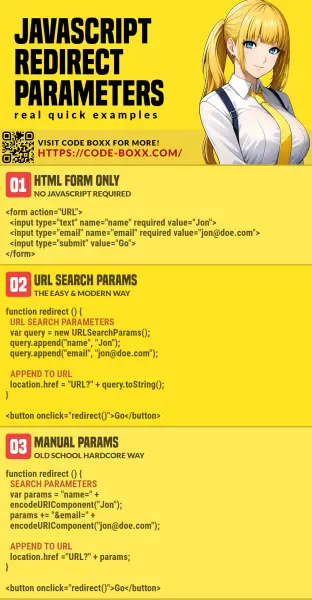Welcome to a tutorial on how to redirect with parameters in Javascript. Need to redirect the user to another page and pass some data along?
To redirect with parameters in Javascript:
var query = new URLSearchParams();query.append("KEY", "VALUE);location.href = "http://site.com/page?" + query.toString();
That covers the quick basics, but read on for more examples!
TLDR – QUICK SLIDES
[web_stories_embed url=”https://code-boxx.com/web-stories/redirect-parameters-javascript/” title=”Redirect With Parameters In Javascript” poster=”https://code-boxx.com/wp-content/uploads/2021/11/STORY-JS-20230518.webp” width=”360″ height=”600″ align=”center”]
Fullscreen Mode – Click Here
TABLE OF CONTENTS
REDIRECT WITH PARAMETERS
All right, let us now get into more examples on how to redirect with parameters in Javascript.
1) HTML FORM ONLY
<form action="1-form-only.html">
<input type="text" name="name" required value="Jon">
<input type="email" name="email" required value="jon@doe.com">
<input type="submit" value="Go">
</form>A quick reminder to those who may have forgotten, we don’t actually need Javascript to “redirect with parameters”. Just create an HTML form, give all the fields a name. The browser will do the rest of the magic on submission – This will “redirect” to http://your-site.com/1-form-only.html?name=Jon&email=jon%40doe.com.
2) URL SEARCH PARAMETERS
<!-- (A) JAVASCRIPT -->
<script>
function redirect () {
// (A1) URL SEARCH PARAMETERS
var query = new URLSearchParams();
query.append("name", "Jon");
query.append("email", "jon@doe.com");
// (A2) APPEND TO URL
location.href = "2-search-params.html?" + query.toString();
}
</script>
<!-- (B) TEST BUTTON -->
<button onclick="redirect()">Go</button>As in the introduction above:
- We create a
var query = new URLSearchParams()object. - Use
query.append("KEY", "VALUE")to add parameters. - Lastly,
query.toString()to append all the parameters behind your URL.
3) MANUAL PARAMETERS
<script>
function redirect () {
// (A1) SEARCH PARAMETERS
var params = "name=" + encodeURIComponent("Jon");
params += "&email=" + encodeURIComponent("jon@doe.com");
// (A2) URL WITH SEARCH PARAMETERS
var url = "3-manual.html?" + params;
// (A3) REDIRECT
location.href = url;
}
</script>
<!-- (B) TEST BUTTON -->
<button onclick="redirect()">Go</button>Lastly, here is the old-school way to manually build the URL and query string.
DOWNLOAD & NOTES
Here is the download link to the example code, so you don’t have to copy-paste everything.
SORRY FOR THE ADS...
But someone has to pay the bills, and sponsors are paying for it. I insist on not turning Code Boxx into a "paid scripts" business, and I don't "block people with Adblock". Every little bit of support helps.
Buy Me A Coffee Code Boxx eBooks
EXAMPLE CODE DOWNLOAD
Click here for the source code on GitHub gist, just click on “download zip” or do a git clone. I have released it under the MIT license, so feel free to build on top of it or use it in your own project.
EXTRA BITS & LINKS
That’s all for the tutorial, and here is a small section on some extras and links that may be useful to you.
WHICH IS THE BEST METHOD?
Personally, I will stick with the modern new URLSearchParams(). This is just a lot more convenient and easier to work with. But if you have to support ancient browsers, the hidden form is not a bad idea.
LINKS & REFERENCES
- How To Build Query Strings In Javascript – Code Boxx
- URL Search Params – MDN
- Encode URI Component – MDN
INFOGRAPHIC CHEAT SHEET

THE END
Thank you for reading, and we have come to the end. I hope that it has helped you to better understand, and if you want to share anything with this guide, please feel free to comment below. Good luck and happy coding!
